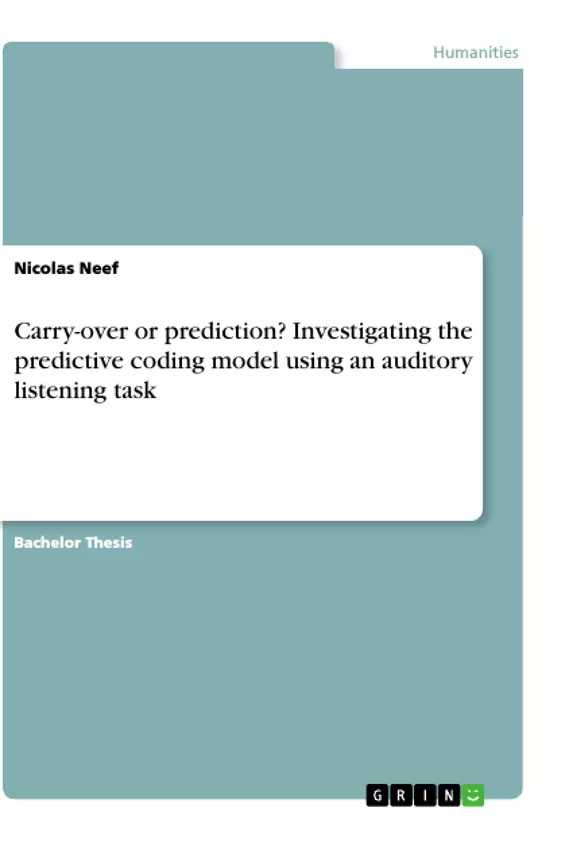Researches have come up with the framework, that for the fluency of our perception we fundamentally rely on top-down predictions, which occur prior to the appearance of actual external stimuli. These predictions lead to very specific modulations of our perceptual units to facilitate perception. The theory behind this framework is the predictive coding theory, which has gathered increasing interest in research. The predictive coding theory could provide a better understanding of how we cope with perceiving our complex environment. For this study focus lies on the auditory domain. A recent study, conducted by Demarchi et al. (2018), could find evidence supporting the predictive coding framework. By analyzing MEG data they could even show, that predictions are so sharply tuned, that they contain specific tonotopic information about an upcoming tone. Due to the fact, that they trained a classifier on pre-stimulus data to decode post-stimulus data, their results are confounded with a carry-over effect (activity still present from previous stimuli). The purpose of this study is supporting this study and rule the carry-over effect out as the only explanation for their findings. We therefore conducted a follow-up experiment and changed the paradigm, as we included conditions with fixed and random stimulus omissions. Since no prediction activity should be found when the omission is fixed, a higher mean decoding accuracy in the random omission condition would directly indicate towards a tone-specific prediction. In our MEG-experiment we can provide further evidence for the findings of Demarchi et al. (2018), by finding this very result.
Inhaltsverzeichnis (Table of Contents)
- Abstract
- Introduction
Zielsetzung und Themenschwerpunkte (Objectives and Key Themes)
This study aims to investigate the predictive coding model in the auditory domain, focusing on whether auditory predictions carry specific information about upcoming auditory events. The study seeks to provide further evidence for the findings of Demarchi et al. (2018), particularly addressing the possibility of a carry-over effect confounding their results.
- Predictive coding theory and its role in sensory processing
- Auditory predictions and their influence on perception
- The role of top-down predictions in reducing sensory redundancy
- The neural code of predictions and its relationship to actual sensory input
- The use of omission trails to decouple top-down prediction activity from bottom-up activity
Zusammenfassung der Kapitel (Chapter Summaries)
- Abstract: The abstract introduces the concept of predictive coding, its role in perception, and the study's objective to further investigate the predictive coding model in the auditory domain. It highlights the use of omission trails in the study and the aim to rule out carry-over effects.
- Introduction: This chapter delves into the concept of predictive coding, exploring the theory's origins, mechanisms, and its implications for understanding how the brain processes sensory information. It discusses the role of predictions in reducing sensory redundancy and explores the relationship between top-down predictions and actual sensory input. The chapter also reviews previous research on auditory prediction, including studies using repetition suppression and omission trails.
Schlüsselwörter (Keywords)
Predictive coding, auditory perception, top-down prediction, sensory redundancy, omission trails, MEG data, classifier, neural code, carry-over effect, entropy, tonotopic information.
Frequently Asked Questions
What is the central focus of this auditory study?
The study investigates the predictive coding model to determine if our brain uses top-down predictions to facilitate auditory perception.
What is the "carry-over effect" mentioned in the abstract?
It refers to neural activity from previous stimuli that might still be present, potentially confounding results that are meant to show "new" predictions.
How does the study use "omission trials"?
By including trials where expected tones are omitted, researchers can isolate top-down prediction activity from actual bottom-up sensory input.
What role does MEG data play in this research?
Magnetoencephalography (MEG) is used to record brain activity with high temporal resolution, allowing for the decoding of specific tonotopic information.
Did the study support the findings of Demarchi et al. (2018)?
Yes, the results provided further evidence for predictive coding by ruling out the carry-over effect as the sole explanation for the findings.
- Citation du texte
- Nicolas Neef (Auteur), 2018, Carry-over or prediction? Investigating the predictive coding model using an auditory listening task, Munich, GRIN Verlag, https://www.grin.com/document/981164



